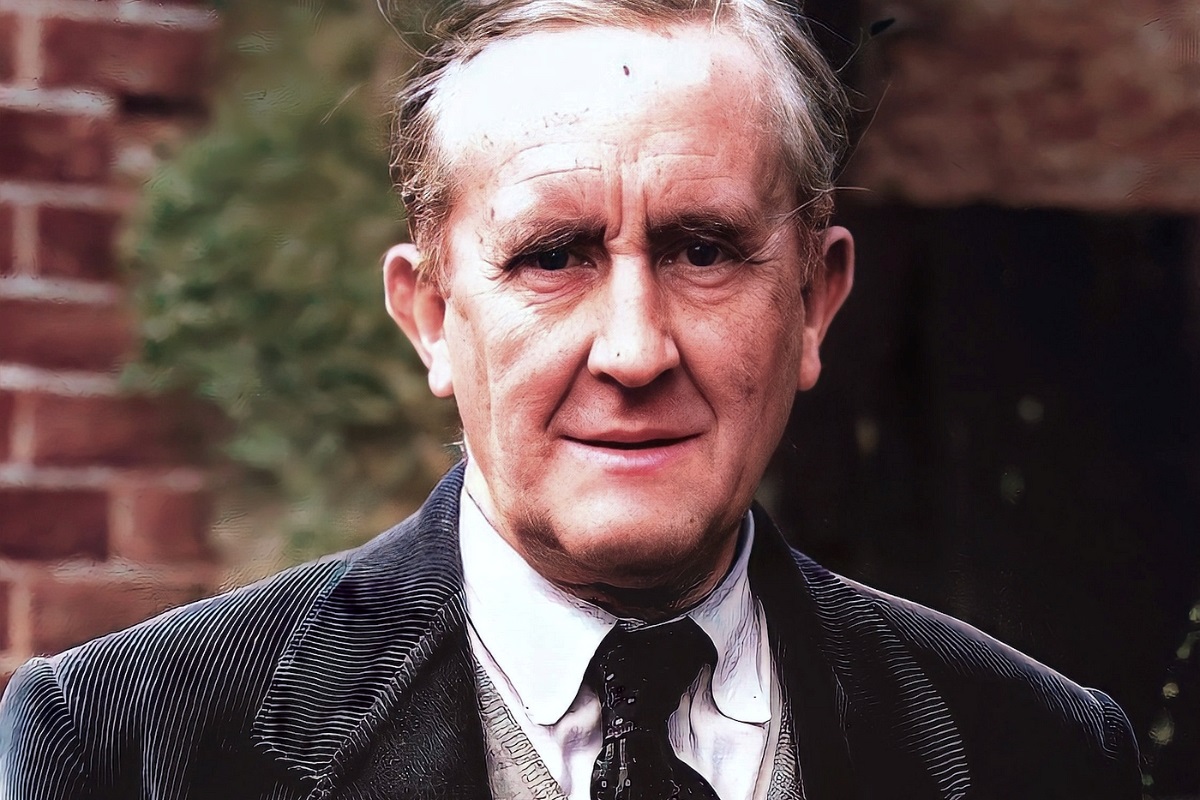
J. R. R. Tolkien, the renowned author of “The Lord of the Rings” trilogy, is a figure who has captivated the hearts and minds of countless readers around the world. Beyond his literary achievements, Tolkien led a fascinating life filled with intriguing experiences and remarkable accomplishments. In this article, we will delve into 20 astounding facts about J. R. R. Tolkien that showcase his incredible journey and contributions to the world of literature. From his early passion for language creation to his stint as a codebreaker during World War I, this article will reveal lesser-known aspects of the life and genius of one of the most beloved authors of all time. So, grab your elven cloak, and let’s embark on a mesmerizing exploration of the remarkable world of J. R. R. Tolkien.
Key Takeaways:
- J. R. R. Tolkien’s vivid imagination and linguistic genius led to the creation of beloved fantasy worlds and languages, inspiring generations of readers and writers.
- Tolkien’s dedication to his craft, his profound impact on the fantasy genre, and his enduring legacy continue to captivate and inspire audiences worldwide.
J. R. R. Tolkien had a vivid imagination.
One of the most astounding facts about J. R. R. Tolkien is his incredibly vivid imagination. He created intricate fantasy worlds that captivated readers and are still beloved today. From Middle-earth to the Shire, his creativity knew no bounds.
Tolkien was a linguistics genius.
Another mind-blowing fact about J. R. R. Tolkien is his deep understanding of languages. He not only invented his own languages like Elvish and Dwarvish, but he also had a deep knowledge of ancient languages such as Old English and Old Norse.
The Lord of the Rings took Tolkien over a decade to write.
Did you know that it took J. R. R. Tolkien over a decade to write The Lord of the Rings trilogy? The amount of time and effort he put into crafting this epic story is truly remarkable and shows his dedication to his craft.
Tolkien was friends with C.S. Lewis.
J. R. R. Tolkien had a close friendship with fellow author C.S. Lewis. They were both members of the literary group known as the Inklings and often shared their work with each other for feedback and support.
The Hobbit was meant to be a children’s book.
When J. R. R. Tolkien wrote The Hobbit, he originally intended it to be a children’s book. Little did he know that it would become a precursor to his epic masterpiece, The Lord of the Rings.
Tolkien served in World War I.
J. R. R. Tolkien experienced the horrors of World War I firsthand. His experiences in the war had a profound impact on his writing and shaped the themes of heroism and sacrifice in his works.
The Balrog in The Lord of the Rings was inspired by a nightmare.
One of the most chilling creatures in The Lord of the Rings, the Balrog, was actually inspired by a nightmare that J. R. R. Tolkien had. This shows how his dreams became a source of inspiration for his incredible stories.
Tolkien was a professor at Oxford University.
Before becoming a famous author, J. R. R. Tolkien was a professor at Oxford University. He taught courses on languages and literature, which allowed him to delve deep into his passion for storytelling.
Tolkien had a close bond with nature.
Nature played a significant role in J. R. R. Tolkien’s life and his works. He often went on long walks and found solace in the beauty of the natural world, which is reflected in the lush landscapes of Middle-earth.
The Silmarillion was published posthumously.
The Silmarillion, a collection of Tolkien’s myths and legends, was published after his death. It provides a deeper understanding of the history and lore of Middle-earth and showcases the vastness of Tolkien’s imagination.
Tolkien was a devout Catholic.
J. R. R. Tolkien’s faith had a profound influence on his writing. His Catholic beliefs are reflected in the moral and spiritual themes that are present throughout his works.
The Lord of the Rings has sold millions of copies worldwide.
The popularity of The Lord of the Rings is undeniable. It has sold millions of copies worldwide and continues to enchant new readers with its timeless story of good versus evil.
Tolkien’s initials stand for John Ronald Reuel.
J. R. R. are the initials for John Ronald Reuel Tolkien. This interesting fact gives us a glimpse into the man behind the extraordinary fantasy worlds he created.
Tolkien was a skilled artist.
In addition to being a talented writer, J. R. R. Tolkien was also a skilled artist. He created intricate illustrations of his characters and landscapes, bringing his world to life visually as well.
The Lord of the Rings was voted the best book of the 20th century.
In a survey conducted by the Waterstone’s bookstore chain, The Lord of the Rings was voted the best book of the 20th century. This accolade speaks to the lasting impact and enduring popularity of Tolkien’s masterpiece.
Tolkien’s son, Christopher, published his father’s unfinished works.
After J. R. R. Tolkien’s death, his son Christopher took on the task of editing and publishing his father’s unfinished works. This dedication allowed fans to delve even deeper into the world of Middle-earth.
Tolkien’s love story inspired the characters of Beren and Lúthien.
J. R. R. Tolkien’s own love story with his wife, Edith, served as the inspiration for one of his most beautiful and tragic love stories, that of Beren and Lúthien. Their story is woven throughout the epic tale of The Silmarillion.
Tolkien was a founding member of the fantasy genre.
With his groundbreaking works, J. R. R. Tolkien laid the foundation for the fantasy genre as we know it today. His imaginative storytelling paved the way for countless authors to explore the realms of magic and mythical creatures.
The Lord of the Rings trilogy was adapted into a successful film franchise.
Peter Jackson’s adaptation of The Lord of the Rings trilogy brought Tolkien’s epic to the big screen and garnered critical acclaim, winning numerous Academy Awards. It introduced a whole new generation to the magic of Middle-earth.
Tolkien’s legacy continues to inspire.
The impact of J. R. R. Tolkien’s work extends far beyond his lifetime. His stories continue to inspire writers, filmmakers, and fans alike, ensuring that his legacy will live on for generations to come.
Conclusion
In conclusion, J.R.R. Tolkien was a literary genius whose impact on the world of fantasy and literature cannot be overstated. His captivating stories, intricate world-building, and rich characters have enthralled readers for generations and continue to inspire writers and fans alike.
From his creation of Middle-earth and iconic characters like Frodo Baggins and Gandalf the Grey to his deep knowledge of languages and mythologies, Tolkien’s imagination knew no bounds. His works, including “The Hobbit” and “The Lord of the Rings” trilogy, have been immensely successful, spawning film adaptations that have further solidified his legacy.
Aside from his literary achievements, Tolkien’s life was also marked by his experiences during World War I and his academic career as a professor of Old English. These aspects of his life undoubtedly influenced his storytelling and added layers of depth to his works.
Ultimately, J.R.R. Tolkien’s enduring legacy lies in his ability to transport readers to fantastical worlds filled with adventure and wonder, making him one of the most beloved authors of all time.
FAQs
1. What is J.R.R. Tolkien known for?
J.R.R. Tolkien is best known for his enchanting fantasy novels, particularly “The Hobbit” and “The Lord of the Rings” trilogy.
2. Did J.R.R. Tolkien invent languages?
Yes, Tolkien was a linguist and created several languages, such as Elvish, for the inhabitants of Middle-earth.
3. Are there any movies based on Tolkien’s books?
Yes, there have been successful film adaptations of both “The Hobbit” and “The Lord of the Rings” trilogy, directed by Peter Jackson.
4. How did Tolkien’s experiences in World War I influence his writing?
Tolkien served in World War I and the horrors he witnessed greatly influenced the themes of heroism, loss, and the destructive power of war in his works.
5. Was Tolkien a professor?
Yes, Tolkien was a professor of Old English, which greatly influenced his deep knowledge of languages and mythologies.
J.R.R. Tolkien's captivating world continues to enchant readers and moviegoers alike. Delve deeper into Middle-earth's lore with our collection of fascinating facts about "The Lord of the Rings" trilogy, exploring the intricate details that make this epic tale so beloved. For those who can't get enough of Tolkien's creations, we've also gathered intriguing tidbits about "The Hobbit" film adaptations, showcasing the magic behind bringing these stories to life on the big screen. And let's not forget the unsung hero of the series – join us in celebrating the loyalty and bravery of Samwise Gamgee, whose unwavering dedication played a crucial role in Frodo's quest.
Was this page helpful?
Our commitment to delivering trustworthy and engaging content is at the heart of what we do. Each fact on our site is contributed by real users like you, bringing a wealth of diverse insights and information. To ensure the highest standards of accuracy and reliability, our dedicated editors meticulously review each submission. This process guarantees that the facts we share are not only fascinating but also credible. Trust in our commitment to quality and authenticity as you explore and learn with us.


